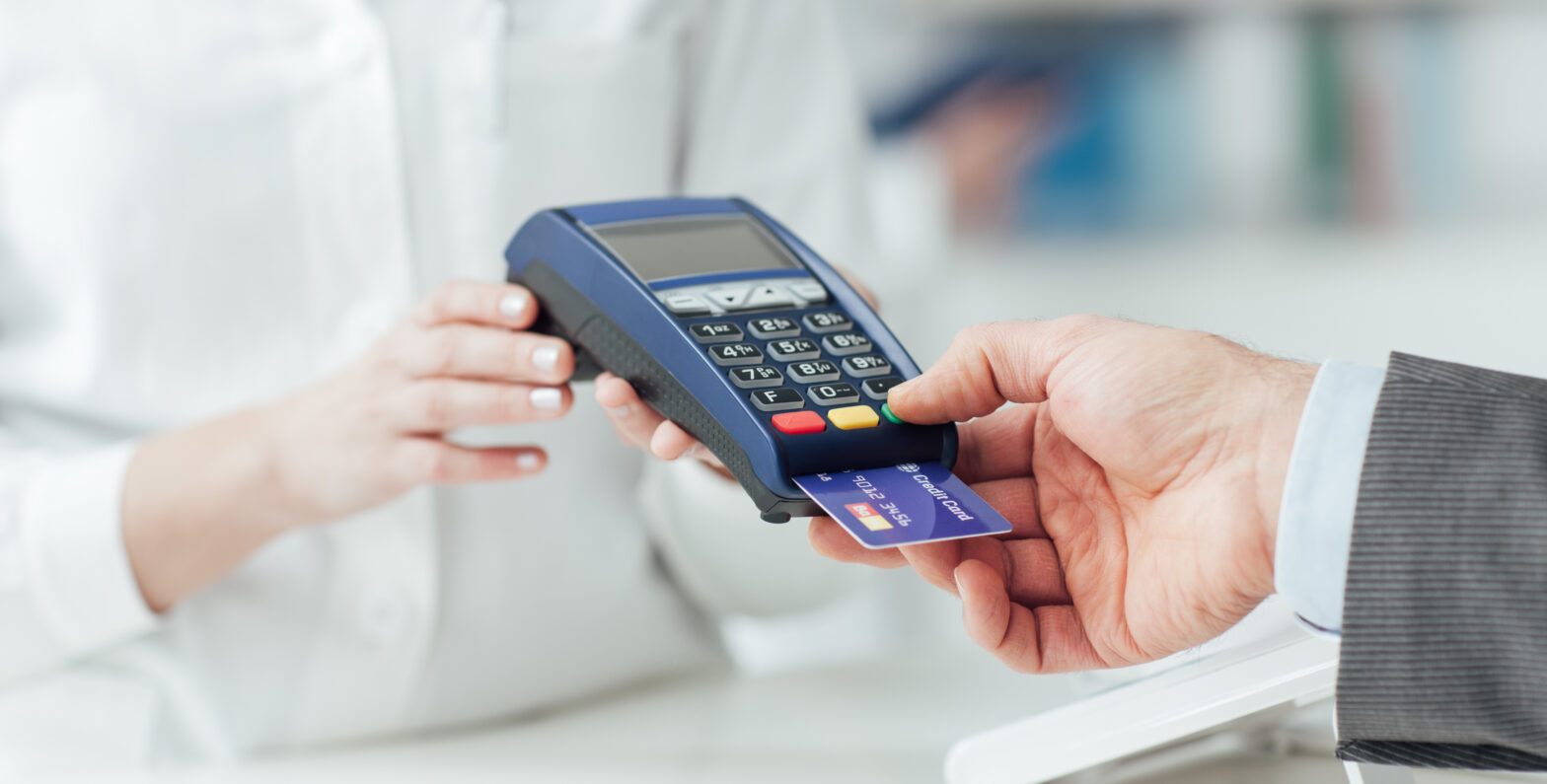UPDATED: With cash now making up just 10 per cent of payments, taking card payments has never been more important for small businesses.
The most common method today is contactless – making up 87 per cent of all card payments, helped by the limit raise to £100 in October 2021.
It is true it can be a nightmare for businesses to get started. You must pay for the privilege and the amount you pay can vary with every transaction.
But accepting card payments is both simple and cost effective for small businesses and as high street banks and cash points become harder to find, not taking cards could entice customers to shop elsewhere.
But who can you trust? Why do you need to pay? To help, here are five essential need-to-knows. We’ve put together a guide to get you started and written it in plain English to try and make it as painless as possible to understand.
#1 – Know who you’re dealing with
To understand the process, every transaction you accept on a card involves several bodies and they all receive some payment from the merchant (you).
They are the card issuer (the bank or financial institution that provided the card to the customer), the acquirer (such as WorldPay, Zettle, Stripe, etc – an organisation that facilitates the authorisation, processing and settlement of the transaction) and finally, the card scheme (the brand on the card, e.g. Visa, MasterCard, AmEx, etc).
There are many card processing suppliers on the market. They range from your local bank to a specialist processing supplier. However, in practice they all do the same thing.
15 Popular Card Payment Processors
| Name of Processor | Website |
|---|---|
| Adyen | adyen.com |
| Amazon Pay | amazonpayments.com |
| Braintree | braintreepayments.com |
| Cybersource | cybersource.com |
| Elavon | elavon.co.uk |
| Handepay | handepay.co.uk |
| Small Business Pro | smallbusiness.co.uk/business-pro |
| Shopify Payments | shopify.co.uk/payments |
| Square | squareup.com |
| Stripe | stripe.com |
| SumUp | sumup.co.uk |
| takepayments | takepayments.com |
| WorldPay from FIS | fisglobal.com |
| Zettle | zettle.com |
| 2Checkout by Verifone | 2checkout.com |
#2 – Make sense of why it costs
Ok, we are going to tell you to suck eggs here but bear with us. Most providers of card payment terminals will quote you a basic rate for credit and debit card processing which is based on a ‘chip and PIN’ transaction using a card issued in the same country it is being processed (i.e. here in the UK).
That means the customer uses a card that has an electronic chip embedded into it and they validate they are the genuine owner of that card using a PIN (just like at the cash point). This greatly reduces the chance of plastic card fraud and these types of transactions are now the norm in the UK. They are also considered to be the most secure and, as such, attract some of the lowest fees, which is why most providers use them in their quote.
Expect to get quotes such as 15p per transaction or x percentage of each transaction. What’s best value for you depends on how many transactions you carry out and what the average value of them is.
The fees you will pay are dependent upon several factors including your turnover and your risk. Higher turnover businesses should be able to obtain a lower fee.
Regarding risk, the banks will look at your trading risk in two ways. Firstly, are you selling a high-risk product in a high-risk industry, such as travel or gambling? And secondly, are the payments you accept customer present (face to face) or customer not present (over the telephone)?
In all cases I recommend you ask the suppliers to support their service-offer with an estimation of fees and based upon your payment history and if they don’t, don’t use them.
#3 – How to get your payment terminal
Next, you need to think about how you go about getting your payment terminal. This depends a lot on the size of your business and for an SME it’s normally easiest to go through an ‘introducer’. These companies work with thousands of businesses and have a greater buying power when it comes to securing a better rate than if you attempted to do it solo.
Most small business will use a basic bank terminal. However, many POS venders may support a pin pad using a standard card payment application. Most UK banks will support a combined cards processing and terminal package in one. There are a number of card payment ‘aggregators’ that may be able to offer better value and better overall support for medium to larger businesses.
“In terms of overall fees you must consider the cost of ownership/total fees paid”
If you want to find out more about your card payment options, you can easily compare providers with Takepayments.
#4 – Understand those fees
Joining fees: These are variable, some providers charge but others don’t. Look around to see who charges and who doesn’t and factor this into the price. As a rule of thumb, you’re more likely to pay a joining fee if a representative comes out to see you, explains in detail the offer and completes the paperwork with you. This can give you the confidence to fully understand the set-up and as a result can be well worth the fee.
In terms of overall fees you must consider the cost of ownership/total fees paid. This means you need to be aware of all costs including an initial joining fee, ongoing fees and any penalty or termination fees.
Note that many suppliers will lure you in with a great headline fees for you to only realise later that other fees have been inflated. This is why you need to ask your intended supplier to support a calculated estimation of the total fees you would pay using their service.
Merchant Services Charges (MSC)
This is the most complicated section, as the price is calculated on each transaction and can vary from transaction to transaction, but roughly speaking the average business will pay £1 a day to have a card terminal.
Simply put, it breaks down like this:
- BASIC RATE (cost to process the transaction)
- + PREMIUM CHARGES (processing costs for transactions that attract fees above the basic rate, if applicable)
- + AUTHORISATION FEE (sometimes called Bank 24 on statements)
- = PRICE YOU PAY FOR A TRANSACTION.
Rates can vary depending on the type of transactions you complete – face-to-face chip and pin, customer not present, foreign cards, premium cards and magnetic stripe swiping all carry different rates per transaction. Some customers will take the option of paying a percentage of each transaction, others so many pence on each transaction – typically around 15p. It all depends on what the value of your average sale is, how many transactions you do daily and what type of customer you serve.
There are primarily two types of card payment (merchant service) fee options.
The first is described as cost plus or interchange plus and it tends to be offered only to larger companies. This is the most transparent way to pay for card payments, however it can be a little confusing.
Interchange plus = interchange fee (per cent) + Visa or Mastercard scheme fee (per cent and pence per transaction) + bank processing fee (pence per transaction).
The second option is described as blended and it means a blend of the three cost plus fees to make one percentage fee. This is simpler to understand but with this option, the bank will have made a number of assumptions in its favour in order to calculate your blended rate.
My advice is not to just accept the blended rate and to ask your provider to also calculate a cost plus/interchange plus rate.
#5 – Get going
Most applications are processed in a few days which means you could be up and running within a week of signing your agreement. In order to get to this stage, a few checks will be made such as, what does your business do? Do you sell face to face or over the internet? How are your finances? Do you file your tax returns on time? Assuming that’s all fine, you’ll be set up and ready to start taking card payments from your customers.
Top card payments tips for small business owners:
Nick Healy, managing director, Suresite, offers his advice on how to choose the best payment provider for your specific type of business.
- Don’t watch as customers put items back on the shelf – let them pay the way they want. It’s easier than you think.
- Ask the suppliers to estimate the fees that you will pay using your historic transaction data.
- Shop around and compare not only fees but the complete service they can offer.
- Don’t just look at the headline rate – ask for a list of all possible fees billed.
- Does the supplier provide a terminal or support the equipment you are using (point of sale/website)?
- Would you make use of a Bluetooth portal or GPRS mobile terminal?
- Does the supplier offer any form of added value services? These could include MI reporting or access to your data via a customer website portal.
- Does the supplier support its customer using human beings or an automated service? Customer support is key if something goes wrong.
- Can the supplier offer different settlement terms? How quickly will they pay you? This will vary from next day credit or three days credit, dependent on your cash flow position.
- Does the supplier offer support for PCI compliance and if so what and what fees are involved?
- All merchants must undertake a PCI (Payment Card Industry) security test each year which can be daunting, however the better suppliers will hand hold through the process to ensure that you pass.
More on taking card payments
Taking card payments – everything you need to know (eBook download) – For small businesses, offering the right payment methods is what could turn window shoppers into paying customers, and that’s the aim of the game, right?
The essential guide to POS systems – In this guide, we take a look at everything small business owners need to know about buying a point of sale (POS) system.
10 card payment machines ideal for small business – Featuring the SumUp Air, Zettle 2, and Square, we break down the fees and functions of the best card payment machines for UK small businesses
Find a payment provider today
Simply fill in the free merchant account quote form here and answer a few questions (it takes less than a minute).
Receive free quotes from suppliers that may meet your requirements







